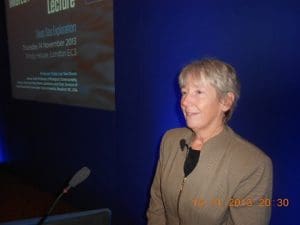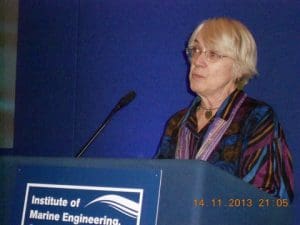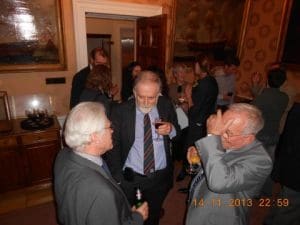
Professor Cindy Lee Van Dover at the podium delivering her slides speech
The IMarEST Stanley Gray Lectures (and the annual Stanley Gray Awards) are named in memory of Stanley Gray who was the Chief Mechanical Engineer at the Port Directorate of Basra during the 1950s & 60s. When he died in 1973 he left half his estate to be held by the Institute in trust to create the Stanley Gray fund. He expressed the wish that the money should be awarded via a scholarship or prize to wherever the Institute saw distinction in Marine Engineering. This remit has been expanded following due process to include Marine Science and Technology. The Stanley Gray Series of prestige lectures is held to mark his generosity to, and patronage of the Institute.
The IMarEST Stanley Gray Lecture series was launched in 2002 to reflect the broadening scope of the Institute’s remit. This lecture is given by key figures from the fields of marine engineering, science and technology. This year’s lecture was presented by Professor Cindy Lee Van Dover*, Harvey Smith Professor of Biological Oceanography, Director, Duke University Marine Laboratory and Chair, Division of Marine Science & Conservation, Duke University, Beaufort, NC, USA. The topic was deep sea exploration and use, and the lecture was entitled “Deep-Ocean Industrialization and Responsible Stewardship: Extraction of Ore from Deep-Sea Hot Springs”. The event took place at upper floor auditorium of the magnificent Trinity House at Aldgate in the heart of the Square Mile, which next year celebrates its 500 years (1514-2014); what an anniversary!

Dr. Phelomene Verlaan introducing the speaker
Dr. Philomene Verlaan, Senior Technical Adviser at IMarEST introduced the speaker.
As our ability to access the seafloor for scientific study has increased, so has interest in exploitation of natural resources of the deep seabed. Deep-sea hydrothermal-vent ecosystems have stimulated decades of scientific research and hold promise of mineral resources that also serve societal needs. Some endemic vent taxa thrive only in vent environments, but vent-associated organisms are adapted to a variety of natural disturbances, from tidal variations to earthquakes and volcanic eruptions. The talk explored responses of vent communities to natural disturbances, considering the potential consequences of their emergent industrialization, describing associated deep submergence research techniques, introducing elements of the first-ever deep-sea environmental baseline for a hydrothermal vent system, and also suggested some mitigation approaches that might facilitate recovery of vent ecosystems after a mining event.

a full house!
More than ten interesting questions followed from the 100 plus member and friends audience, most of them young scientists. Worth noting that as we proceeded in the auditorium, Octapous Garden, the famous Beatles song was tuned on, a very relevant reminder…entertaining and passing on the real message! A well organised buffet reception followed were we had the chance for asking more questions, networking and meeting friends from the past!

Networking at the reception…
*Dr Cindy Lee Van Dover is a deep-sea biologist with an interest in the ecology of chemosynthetic ecosystems. She began her work in this field in 1982, joining the first biological expedition to hydrothermal vents on the East Pacific Rise. After earning a Master’s degree in ecology from UCLA in 1985, she continued her graduate education in the MIT/Woods Hole Oceanographic Institution Joint Program in Biological Oceanography. There she joined numerous expeditions and published on diverse topics such as reproductive strategies and recruitment of vent invertebrates, vent food webs, and taxonomic descriptions of new species. In 1989, she described a novel photoreceptor in a vent invertebrate, which in turn led to discovery and characterization of a geothermal source of light at vents and investigations of its biological significance. On receiving her Ph.D. in 1989, Van Dover joined the group that operates the deep-diving submersible ALVIN. She qualified as pilot in 1990 and was pilot-in-command of 48 dives. She served Chair of the Oversight Committee for the ALVIN upgrade program. Her work with ALVIN and other deep submergence assets has taken her to the seafloor in the Atlantic, Pacific, Indian, Arctic, and Southern Oceans.

Lloyd’s Register’s Dr. Jonathan Morley (centre) talking with delegate friends
Dr Van Dover’s current research focuses on deep-ocean exploration, the study of gene flow and connectivity of deep-sea organisms, deep-sea conservation and environmental management, and, most recently, exploring new models for deep-ocean research through telepresence, distributed research teams of early career scientists, and social media. She has published more than 100 articles in peer-reviewed journals and is an active participant and Chief Scientist in NSF-and NOAA-sponsored field programs to hydrothermal vents and other chemosynthetic environments.

The cover of the book “The Octopus’s Garden”
In addition to research, Van Dover has authored a popular book for the lay audience about the deep sea and her experiences as an ALVIN pilot (Deep-Ocean Journeys; Addison-Wesley, 1997, a.k.a. The Octopus’s Garden).
She is the author of the first textbook on hydrothermal vents (The Ecology of Deep-Sea Hydrothermal Vents; Princeton University Press, 2000), is curator of ‘Beyond the Edge of the Sea’, a traveling exhibition of original deep-sea art by watercolor artist Karen Jacobsen, and is helping to develop Art and Science: Envisioning Ocean Depths, a mixed media exhibition. Dr Van Dover is a Fulbright Scholar and Fellow of the American Association for the Advancement of Science. She is currently the Harvey W Smith Professor of Biological Oceanography in the Division of Marine Science and Conservation of the Nicholas School of the Environment, Duke University, where she serves as Chair of the Division and Director of the Marine Laboratory.
The video from the lecture will be available here to watch soon!





